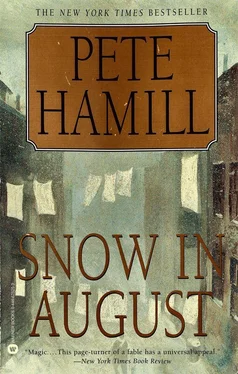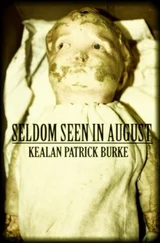Coming in Michael’s direction.
With three other members of the Falcons.
All of them walking with a rolling swagger. Grab-assing. Bumping each other. Smoking cigarettes.
Michael thought: Holy shit.
Frankie McCarthy.
He’s back.
He’s free.
Jesus.
Michael couldn’t cross to his own house without being seen. He flattened himself against the windows of Pete’s Diner, then inched around the corner into Collins Street, trying to look casual. He hoped Frankie and the Falcons were yelling at girls. He hoped they had gone to Unbeatable Joe’s to drink beer. Most of all, he hoped they hadn’t seen him.
The garbage truck was gone. Sonny was batting against Jimmy Kabinsky.
“Hey, let’s go!” Michael shouted. “Frankie McCarthy’s out of jail. He’s coming up Ellison Avenue.”
“Oh, shit,” Sonny said.
He pocketed the ball and held the bat like a club as they trotted together toward MacArthur Avenue, away from Ellison, away from Frankie. Only two blocks away to the right, on the corner of Kelly Street, was the synagogue. We’d be safe there, Michael thought. But how could he bring Jimmy to a place where he believed Jews mixed human blood into the goddamned matzohs? That would be what Rabbi Hirsch called meshugge .
So they ran another long block to the park, leaping onto the slats of the benches, then scaling the stone wall and dropping four feet to the ground. They were all silent, breathing hard as they moved through the debris of the winter: fallen tree limbs, pine cones, beer containers, overturned trash baskets, a lone shoe. They kept moving until they reached a stone transverse bridge, with a few cars moving over it, and found shelter in the darkness under the wide arch. They were now all breathing hard.
“He musta made bail,” Sonny said. “The Falcons musta chipped in to get the two hundred and fifty bucks.”
“You know he’s gonna come after us,” Michael said.
“Probably,” Sonny said. “He’s gotta blame some body. He’s up on a felony. Maybe worse, if Mister G never comes out of the coma. That could be murder, for chrissakes. And he probably figures we’re the only witnesses, that we could put him in the can for years.” He shivered in the stony darkness. “We tell him about Jimmy’s uncle, he won’t believe us. Nobody’s that fucking stupid.” He glanced at Jimmy, sucked in deep breaths. “But you know, if he gets caught pullin’ any shit while he’s out on bail, they’ll really hang his ass. So you ask me, he won’t do nothin’ direct , know what I mean?”
“In other words,” Jimmy said, “the Falcons could get us, even though Frankie’s not with them in person?”
“Exactly,” Sonny said. “Frankie throws up his fucking hands when the cops come knocking at his door, and says, hey, I was home listening to the fuckin’ radio and I got witnesses to prove it.”
“Meanwhile, we take a good beating,” Jimmy said.
“If we’re lucky,” Sonny said, “it’s only a fucking beating.”
A dozen cars roared across the stone bridge above them and then were gone.
“What the hell are we gonna do, Sonny?” Michael said.
“I don’t know yet. I don’t know.”
For three straight nights, Michael dreamed of rooms that were both strange and familiar, full of many beds, with brown covers and blue pillows, and chairs draped with sheets. Above the beds there were frames without pictures. The beds were very short, then very long, so that there was no clear path from room to room, and when he came to the end of the rooms, the apartment did not end: other rooms opened, new and strange, filling him with dread. Dogs barked, but he could not see them. Then he was outside and saw white horses on the factory roof. In the dark doorway of Slowacki’s candy store, a man with a sallow face and a toothy grin tipped his bowler hat and the top of his head was made of raw hamburger. Then Michael was alone in his own apartment, with his father’s picture on the wall, and someone was shuffling through the darkness, heavy feet dragging, and his mother wasn’t there and his father wasn’t there and he ran into the bathroom and slammed the door, listening to the shuffling, and turned on the hot-water tap and red snow came from the tap and rose like tiny flowers into the air.
Each night, he woke up sweating and trembling and afraid of falling back into the dream. He could not call his mother. I’m not some little kid, he thought. This is a dream. That’s all. It’s not real. This room is real. That window. This bed. My clothes and my comics. Dreams are dreams. And then he’d drift off and the images would return, sometimes shifting their order: the white horses first, and then the man with hamburger for hair, and then the endless empty rooms.
He thought about asking for help from Mrs. Griffin on the second floor. She had a worn pamphlet called Madame Zadora’s Dream Book , and Michael wondered if it would explain his dreams. She used the dream book to help her pick horses, or The Number. Kate Devlin didn’t gamble; she said she worked too hard for her money; so Michael wasn’t sure what was meant by The Number. But Mrs. Griffin went every morning to Casement’s Bar to give Brendan the bookmaker her choice of numbers for the day, and it was said that back in 1945 she had won two hundred dollars. Maybe she would know.
One afternoon, he knocked at her door. Mrs. Griffin, small, wiry, and dressed in a quilted pink housecoat, smiled at the sight of him. She asked him in and started boiling water for tea. She did all this with a Pall Mall burning in her fingers.
“I’ve been having these terrible dreams, Mrs. Griffin,” Michael explained. “I thought maybe your book would figure them out.”
She looked wary. “What’s your mother say about them?”
“She doesn’t talk about dreams,” he said. “And, I dunno, it’s hard to talk to her about some things. Like dreams.”
She took a drag on the cigarette, then tamped it out in a saucer.
“What kind of dreams?”
He told her. As she listened, horror spread across her face like a stain. “Oh boy,” she said breathlessly. And listened more. “Oh boy. Oh boy. Oh boy oh boy.”
Then they sat there for a long, silent moment. She peered at him.
“You’re in trouble, Michael,” she said. Her voice was burry from cigarettes.
“Maybe.”
She popped a Pall Mall from her pack and lit it with a wooden match. Her eyes glistened.
“But it’s not trouble you caused, right?”
“Right.”
“You’re worried about somebody with a broken head, right?”
“Right.”
“That’s the hamburger head. And you’re trying to make sense of something, like, you know, putting a picture in a picture frame.”
This hadn’t occurred to him, but he thought about Jackie Robinson’s skin, and nodded.
“In a way.”
“You’re thinking of some other place, not yours, the furniture all covered up and stuff.”
Michael thought: The synagogue? Prague? Rabbi Loew’s study? The attic where they keep the Golem’s dust?
“Sometimes.”
“And you’re thinking of moving away. Like getting on a white horse and riding off into the sunset like Gene Autry or something.”
Michael laughed. She served tea, still smoking.
“From time to time,” he said.
She went into another room and came back with Madame Zadora’s Dream Book . It had a red-and-black cover with a drawing of a woman in a gown covered with symbols, caressing a crystal ball. The symbols made him think of alchemists.
“Well, we figured out some of it,” Mrs. Griffin said. “But I’ll be goddamned if I can make any sense of the bowler hat or the red snow coming out of the water tap.”
Читать дальше












